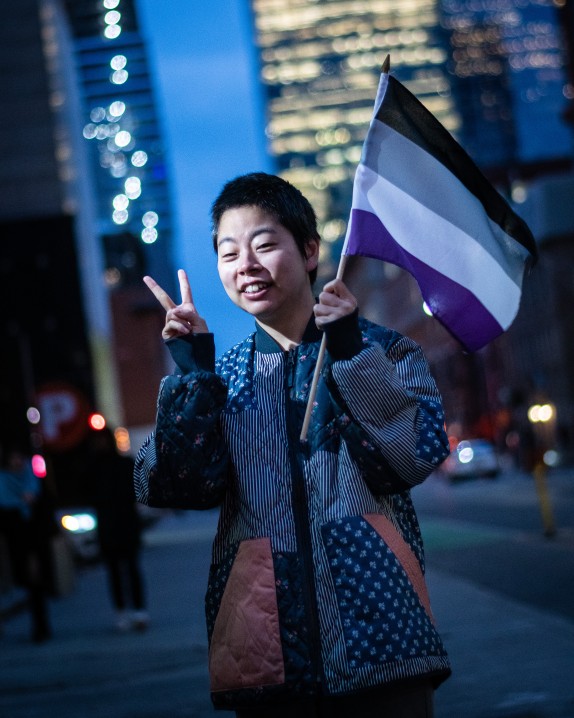Emily Onizuka / Canada
“I used to think I was some kind of frigid ice queen. Actually, I leaned into it quite a bit. I got into fairytales and folktales in high school, and I loved “The Snow Queen” by Hans Christian Andersen. Despite the title character barely being in the book, I started to identify with her. This was even before Disney’s Frozen came out and Elsa became an ace icon.
I tried dating in high school like my friends. It was mostly due to my final fellow single friend getting a boyfriend that I figured I had to try it too, otherwise I’d get left behind. There was a boy a year younger than us who liked to tag along, so he seemed safe enough. I figured I liked him as a friend, so what was the difference between that and liking someone in a romantic kind of way? I never could figure it out. I listened to a lot of Taylor Swift songs while thinking about him to see if I could understand, but I never really did. What was wrong with me? Was I some cold-hearted monster who couldn’t feel love?
We tried kissing. I thought that maybe if I tried it, I would like it and see what the big fuss was about. Books tell me about electric shocks and floating feelings. Taylor Swift sings, “It’s a first kiss, it’s flawless, really something,” in “Fearless”. But for me, it was just kind of wet and messy. I once heard someone describe it as “like an octopus was sucking on my face” at a performance at Buddies in Bad Times Theatre, and that description probably fits it best. I told my friend about it and she said, “Finally!” I told her I thought we did it wrong. She said, “What do you mean? Did your lips touch? That’s it.” That’s it?
I thought maybe I need to do it more to figure out how to like it. The same with sex. But no, I just couldn’t bring myself to like it. After the relationship ended, I felt there was something wrong with me. Was I broken? Actually, he cheated on me, and I wondered if it was because he could tell I just didn’t feel that way about him and couldn’t, no matter how hard I tried.
I wanted to fix myself. I had friends who would go to raves and do drugs and hook up with people. Up until then, I’d only smoked weed and drank from time to time, but I thought maybe this was the answer. I just needed harder drugs and sex with strangers. This was how I spent a few months of grade twelve but needless to say, it didn’t work.
It wasn’t until a year after graduating high school that I found the words “asexual” and “aromantic”. I cried in relief. I wasn’t broken after all. I thought there was something wrong with me and I’d have to see my doctor about it. It didn’t help that asexuality was listed as a mental disorder up until then. For some reason, being asexual bothered me more than being aromantic. I’m not sure why exactly. I think being told that sex is some kind of fundamental basic human need made me think there was something biologically wrong with me. But for romantic love, I thought I knew and understood. My theory was that there was no real difference between platonic and romantic feelings. Romantic relationships were just you picking a particular friend and playing out socially constructed romantic cues together. And marriage was you and that friend committing to being roommates for life. I didn’t even realize that not everyone else felt and thought the same way, so I was surprised to find out there really was some kind of difference others felt.
Actually, I’m in quite a good partnership right now. It turns out that the kind of long-term partnership that I thought marriage was can and does exist. My partner and I define our feelings and relationship differently. I say it’s queerplatonic, while he says it’s a mix of romantic and platonic. Either way, we’ve both discussed our wants and needs and expectations for our relationship, and we’re on the same page and happy with it. We would like to live together once Toronto’s housing rates are affordable (if that ever happens), and have a quiet simple life with lots of cats, no kids, and maybe a small dog. We’ve decided we don’t need to get married. We can just live together. He’s a best friend, life partner, and pet co-parent.
It can be complicated on a legal level though. Would we become common-law? Marriage in Ontario needs to be consummated in order to be valid, but we don’t have sex and don’t plan to, so we technically don’t qualify as married or common-law. At the same time, the government sees a man and woman living together and that paired with us being life partners, they might say that we are. This complicates things in terms of if we’re allowed to visit each other in the hospital if one of us is sick or hurt, next of kin if anything happens to either of us, and tax benefits. All of the typical problems of marriage inequality still apply to us, even in Canada where we pride ourselves on being progressive in this area.
Overall, I’m pretty happy. I’ve figured out what kinds of relationships work for me, and have friends who get it. My parents are still a bit confused as to what asexual and aromantic mean, but are doing their best to be accepting. I’ve been connecting with other asexual and aromantic people who do understand though. In fact, being in more queer spaces and around more queer people is allowing me to explore even more parts of myself such as my gender, and I’m having quite a fun time with it. Let the next chapter begin!“




